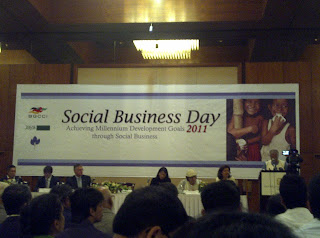If you want to meet an empowered woman, a woman who has built herself up from the bottom, if you want to meet a woman that will inspire you with her story, then go to the Grameen Bank villages of Bangladesh.
The women greeted us with standing up in a group, inside the little self made shelter building, placing their hand to their hand to greet. This was actually developed as a way to get the women to look up and build up their confidence. Then they ask permission to start the meeting and sit down on the benches. They all look at us, and some of them meet my smile with theirs. I wonder if they were excited to share, or if many come here to their village, about two hours outside of Dhaka, to learn their stories.
Despite the language barrier and being dependent on a translator, it is very evident that the Grameen loans the women has taken up has helped them build better lives for themselves and their children.
The first group in this village, was initiated by the woman in the picture to the left. She found out about Grameen Bank about 22 years ago at the market and soon became interested. She went to the Branch that was located closest to request becoming a member. The people at the Branch replied that she lived too far away from that Branch office area, and therefore they could not take her as a member. Then they added, if you're interested we will come to your village and requested her to form a group of five people. Five groups was formed shortly after and they all participated in the then one month long orientation. Since the first groups were formed, several improvements to the village conditions have occurred. Some of these signs are that the children attend school, sanitary conditions have improved, some are phoneladies, half of the group have TVs, five have fridges and everyone have Grameen Saving Pensions.

No End to Hope
They said there is no end to hope, and therefore they continue to take up Grameen Bank loans to expand on their businesses and better themselves.
Pass the Peace.
 |
| Photos with Permission by author (KOF) |
Despite the language barrier and being dependent on a translator, it is very evident that the Grameen loans the women has taken up has helped them build better lives for themselves and their children.
The first group in this village, was initiated by the woman in the picture to the left. She found out about Grameen Bank about 22 years ago at the market and soon became interested. She went to the Branch that was located closest to request becoming a member. The people at the Branch replied that she lived too far away from that Branch office area, and therefore they could not take her as a member. Then they added, if you're interested we will come to your village and requested her to form a group of five people. Five groups was formed shortly after and they all participated in the then one month long orientation. Since the first groups were formed, several improvements to the village conditions have occurred. Some of these signs are that the children attend school, sanitary conditions have improved, some are phoneladies, half of the group have TVs, five have fridges and everyone have Grameen Saving Pensions.
Loans used for various income generating activities The most common things the loans are used for in that village is: for cultivation purposes, vegetable buying and selling, cows, sand & bricks, rice and waterpumps, as well as starting a grocery store and bamboo to create furniture.

No End to Hope
They said there is no end to hope, and therefore they continue to take up Grameen Bank loans to expand on their businesses and better themselves.
Pass the Peace.












